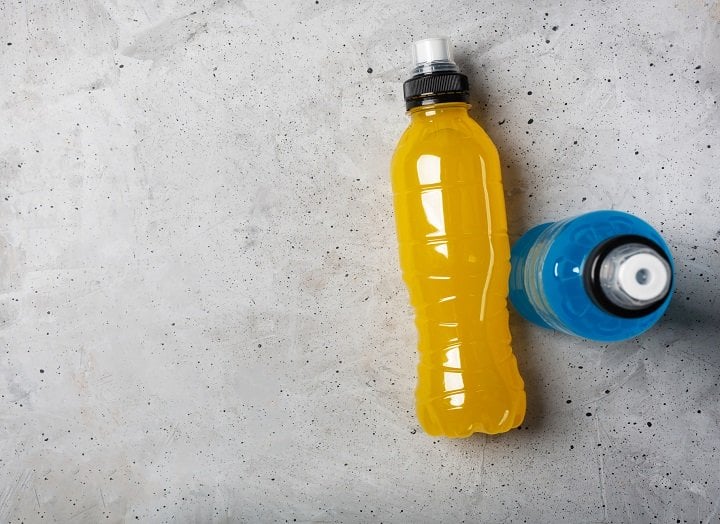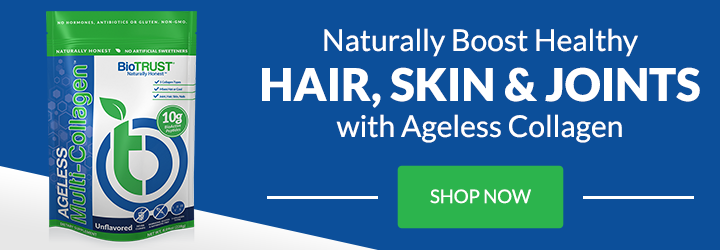Electrolyte Replacement Drinks: Are They Even Worth It?

If you have ever attended a soccer game, football game, or basketball game, odds are you have seen athletes guzzling down electrolyte-enhanced sports drinks. These brightly colored, fruit-flavored electrolyte drinks are advertised as being scientifically developed to help replace electrolytes and enhance recovery.
Industry leading brands of electrolyte drinks sponsor some of the most influential and iconic sports around the world, leading us to believe they are beneficial to athletic performance. However, beyond containing electrolytes, many of these beverages can also be loaded with carbs, sugar, and other additives. With so much jam packed in such a small bottle, we began to wonder: are these electrolyte drinks even worth it?
In today’s article about electrolyte replacement drinks, we go over the following:
- What are Electrolytes?
- Are Electrolyte Drinks Good For You?
- Do You Need an Electrolyte Drink?
- Electrolyte Replacement Options
- Electrolyte Imbalances
- Foods That Contain Electrolytes
- Benefits of Electrolytes
Electrolyte Replacements: The Basics
Now before digging too deeply into the subject at hand, let’s start with the basics. What is an electrolyte?
An electrolyte is an essential mineral such as sodium, chloride, potassium, magnesium, calcium, and phosphate. These minerals are vital to many key functions in the body. That is because these minerals conduct electricity when dissolved in water and are distributed through the fluid in the body. The body then uses their electrical energy to facilitate important bodily functions, such as:
- Controlling fluid balance
- Regulating blood pressure
- Aiding in muscle contractions
- And maintaining blood pH.
At a minimum, the body requires approximately 1,600 to 2,000 mg of electrolytes per day. When not getting enough electrolytes, your body can experience side effects, such as muscle twitches, weakness, and when left untreated, it can lead to more severe consequences.
When we engage in strenuous exercise, we are most likely to lose electrolytes. This is because as you sweat, you’re not just losing water, you’re losing electrolytes as well.
Sodium, specifically, is the primary mineral lost in sweat during exercise. Sodium, like other electrolytes, helps deliver water to your body’s cells. Individually, sodium is a critical electrolyte that is important for blood pressure along with muscle contractions and nerve function. As a result, it is important that we replace the electrolytes our bodies are losing.
Enter Electrolyte Drinks
One of the fastest ways to replenish electrolytes in our bodies is through the consumption of electrolyte drinks.
When it comes to electrolyte drinks, there are many options on the market, including ready-to-drink beverages and mix-with-water tablets or powders. When selecting a drink, it is important to consider your calorie, sugar, and electrolyte needs.
Of the most well-known electrolyte sports drinks are Gatorade and Powerade. These specialized beverages are intended to replace crucial electrolytes and carbohydrates while hydrating at the same time. This type of beverage is ideal for those who engage in prolonged, vigorous physical activity for more than one hour, especially in hot conditions.
Studies have shown that hard-training athletes should consume carb-heavy drinks to ensure muscles receive adequate amounts of energy. 1 Unfortunately, a vast majority of those consuming these types of sports drinks are not engaging in anywhere close to the amount of physical activity needed to experience any benefit.
When taking a closer look and breaking down exactly what is in an electrolyte sports drink such as Gatorade, you will find:
- Calories: 140
- Carbs: 36 grams
- Protein: 0 grams
- Fat: 0 grams
- Sugar: 34 grams
- Sodium: 11% of the Daily Value
- Potassium: 2% of the DV
Looking at sugar alone, that’s comparable to your average candy bar or 12-ounce soda. As a result, many electrolyte sports drinks fall into the category of sugar-sweetened beverages due to their various forms of added sugars.
Recent dietary guidelines recommend reducing added sugars to just six percent of daily calories. Currently, added sugars make up on average 13% of the average daily intake, which means calories from sugar-sweetened beverages may displace those from nutritious foods. For the average person, regularly consuming sugar-sweetened sports drinks without adequate exercise (i.e., intense training) can provide little nutritional value and can contribute to health risks including obesity, tooth decay, and heart disease. 2
Do You Need an Electrolyte Drink?
Below are three important questions to consider when deciding whether your body could benefit from an electrolyte-enhanced sports drink.
1. How long have you been exercising?
If exercising for more than 60 – 90 minutes, especially at a higher intensity, electrolyte drinks may be necessary. On the other hand, water should be the beverage of choice for hydration before, during, and after physical activity lasting less than one hour.
2. Have you been sweating?
Even given the same workout, people sweat differently. The most obvious signs that you’re a heavy sweater is that you often feel like you are sweatier than your fellow gym-goers, or if after a hard workout, your skin feels chalky or gritty. If you have found yourself to have worked up an excessive sweat, water alone may not be enough to keep you fully hydrated.
3. How do you feel?
Always listen to your body. When electrolyte levels drop, the body produces warning signs beyond feeling thirsty. Fatigue, muscle cramps, nausea, and headaches can all point to dehydration, which indicate a need for increased electrolyte intake.
Luckily, not all electrolyte drinks have been formulated to cater only to high-intensity-training athletes. So even if you haven’t answered yes to the above questions, but you still feel your body could benefit from an added boost of electrolytes, there are options out there. Other electrolyte drinks can be found in low-carb or low-sugar options, organic forms, and even with added caffeine.
Electrolyte Replacement Options
One popular electrolyte beverage for those looking to fill their diets with more natural foods is coconut water. Coconut water became a trendy product in the health world as it is touted as a natural source of potassium. On average, one serving of coconut water contains about 500 mg of potassium, which is about the amount of potassium found in a banana.
However, coconut water contains significantly less electrolytes than a sports drink, so coconut water may replace what you’ve lost if your workout is longer than an hour. When comparing coconut water to plain water, both provide adequate rehydration.
Another drink used by many of those looking to increase their electrolytes without all the extras is electrolyte water. Electrolyte-enhanced waters have minerals added to them, which may help your body absorb the water more quickly. These waters appeal to many looking to stay hydrated because they are often flavorless, making them an easy addition to your day.
Even with electrolyte water, it is important to read the label because many just contain a touch of electrolytes for taste, not for actual electrolyte replacement.
It’s a common mix-up that electrolyte water is better than regular water when it comes to hydration. But in reality, it depends on the circumstances. Outside of exercise, electrolyte drinks can be beneficial at other times. Maybe it’s after a few too many drinks at the bar, recovering from a recent stomach bug or virus, or living with certain chronic illnesses.
Electrolyte Imbalances
It is normal for electrolyte levels to fluctuate. However, even when it comes to staying hydrated, it is possible to get too much of a good thing. Electrolyte imbalances occur when the body has too many or not enough, which results in pushing too much water into cells or pulling the water out.
Consuming too many electrolytes can lead to hypernatremia or hyperkalemia. Too much sodium, or hypernatremia, can cause dizziness, confusion, and extreme fatigue. Similarly, hyperkalemia or excessive potassium can lead to nausea, irregular heartbeat, and numbness/tingling.
Older adults are at most risk of experiencing electrolyte imbalances and dehydration. This is because the kidneys may lose some function with age and certain medications can change electrolyte levels or change levels of appetite or thirst.
Foods That Contain Electrolytes
This brings us back to good ole water. Generally, whether you drink bottled or tap water, it most likely contains trace amounts of electrolytes. Outside of sports, hot weather, and illness, regular water works just fine to meet your daily hydration needs. Therefore, water should be the primary source of hydration.
It is commonly recommended to consume eight 8-ounce glasses of water a day. Like all things, the amount of water you need is dependent on your own body, so listening to your personal body signals is a natural indicator of knowing how much water you should be drinking.
Electrolytes can also be found in many natural whole foods, meaning diet can be a good source of most of the electrolytes needed to keep your body fully functioning and well. Some good sources of electrolytes include:
- Sodium: Table salt
- Chloride: Seaweed, tomatoes, lettuce, and olives
- Potassium: Bananas, spinach, potatoes, avocados
- Magnesium: Spinach, avocados, nuts, and seeds
- Calcium: Dairy foods, broccoli, beans, and lentils
- Phosphate: Meat, fish, and sunflower and pumpkin seeds
So, if your diet is filled with healthy, whole foods, you likely have a good foundation of electrolytes without having to consume specialized electrolyte drinks.
Electrolytes Benefits
When it comes down to it, maintaining proper amounts of electrolytes and staying adequately hydrated is essential to supporting peak wellness, yet there are several factors which can influence electrolyte needs.
If engaging in high-intensity exercise or prolonged athletic activities, electrolyte drinks can be beneficial to restore your body. Still, in most cases, electrolyte drinks are nonessential to achieving suitable electrolyte levels. Further, a majority of sport or electrolyte drinks should not be consumed regularly as they can be high in added sugars as well as unnecessary nutrients.
In the end, refreshing old-fashion water accompanied by a healthy diet can satisfy the average person’s electrolyte and hydration demands.





 7 Signs Your Body is Seriously Low on Collagen (not just wrinkles)
7 Signs Your Body is Seriously Low on Collagen (not just wrinkles) Health Expert: "Turmeric Doesn't Work (unless...)"
Health Expert: "Turmeric Doesn't Work (unless...)" 3 Warning Signs Your Probiotic Supplement is a Total Waste
3 Warning Signs Your Probiotic Supplement is a Total Waste

